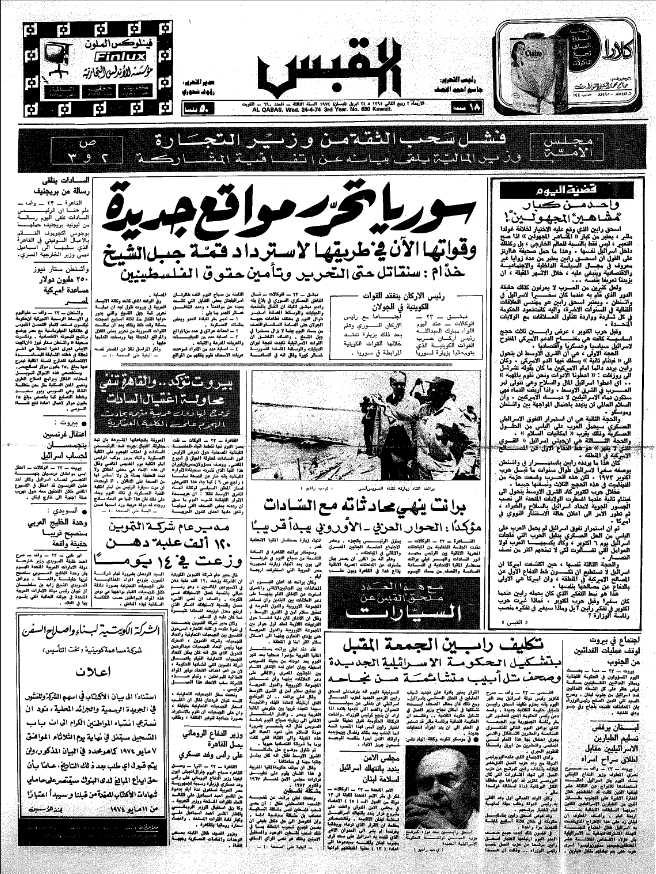Syria served notice today that she would demand Israel’s recognition of “Palestinian national rights” as a condition for truce agreement in the Golan Heights sector of the Middle East front.
Foreign Minister Abdel Halim Khaddam of Syria said at a, news conference that his country would send a representative to Washington next month to start discussions on a separation of forces similar to that carried out between Egypt and Israel in the Suez area. The Syrian delegate will arrive after the Israeli Defense Minister, Moshe Dayan, has presented his country’s plan for disengagement and has left.
Israeli recognition of “Palestinian rights,” which Mr. Khaddam did not define, must come during the discussions, the minister declared. “Israel must understand once and for all that it must recognize the obligation to withdraw from all the Arab territories it occupies, not ony Syrian territory, but all Arab territory without exception,” Mr. Khaddam said.
Return of Lands
“Furthermore,” he added,, “and this is very important fort] the Arabs, Israel must recognize the legitimate, national rights of the Palestinian people. Both these conditions must bet fulfilled before there can be any agreement on the separation of forces between Syria and Israel.”
Mr. Khaddam spoke shortly before the ministerial council of the Arab League ended three days of discussions with an expression of support for Syria. There was a major effort on all sides to paper over sharp differences expressed privately between Syria and Egypt over what tactics to use toward Israel and toward American peace‐making efforts.
The Syrians had accused Egypt in a closed session of the political committee of having isolated Syria by making a separate accord with the Israelis.
The Syrian attack had brought the Egyptian Foreign Minister, Ismail Fahmy, to the conference from Cairo in an apparent effort at appeasement. The two ministers conferred several times alone, and this morning, after a short final meeting, the dapper Egyptian diplomat emphasized to newsmen: “There is no conflict between Syria and Egypt. We are coordinating our positions all the time.” He did not reply, however, when asked about Mr. Khaddam’s conditions for disengagement.
Mr. Fahmy exuded confidence after winning a major point. A summit conference scheduled for next month in Cairo, which risks being torn by dissension, was put off until September in. Rabat, Morocco. As a concession to Syria, the league added the phrase, “unless the Middle East situation compels Syria to ask for an earlier date.”
Mr. Khaddam refused to reiterate publicly his criticism of Egypt and told newsmen that “Syria and Egypt are side by side in this victorious battle.”
He said that although Syria had agreed to stop the fighting’ last October she was still pursuing two main goals: withdrawal of Israeli forces from all territories occupied by Israel since 1967 and recognition of “Palestinian rights.”
He said that the separation of forces was just “one stage” in a total peace program. But he made it clear that he wanted long‐range commitments from !Israel even before this stage !could be achieved, saying that !Syria made no distinction between conditions for a military disengagement and conditions for permanent peace.
It is believed that the Syrians main grievance against the Egyptians and other moderate Arab countries concerns both the signing of an agreement with Israel and the ending of the oil embargo against the United States. The Syrians feel the embargo was lifted too soon, leaving the Syrians alone in fighting for Arab goals.
Mr. Khaddam got some oblique support for his uncompromising position on the Palestinians from the relatively moderate Foreign Minister of Saudi Ara bia, Omar Saqqaf, who told reporter from the Tunis daily newspaper La Pressa that the Arabs were expecting agreements between Israel and Syria and between Israel and the Palestinians. Mr. Saqqaf gave this as a reason for putting off the Arab summit talks until fall.
The council, which groups 21 Arab nations and had a record attendance of 17 foreign ministers, also agreed to set up a nine‐member delegation to respond favorably to a bid from the European Common Market for talks on economic and technological cooperation.




